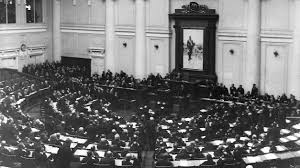The State Duma, the lower house of the Federal Assembly of Russia, is a crucial institution in the Russian political system. It plays a significant role in shaping the country’s laws and policies, though its power is often overshadowed by the strong presidency.
Structure and Composition
The State Duma is composed of 450 deputies, elected through a mixed electoral system. Half of the seats are filled through direct popular vote in single-mandate constituencies, while the other half is allocated through party-list proportional representation.
Powers and Functions
The State Duma possesses a range of legislative and oversight powers. Its key functions include:
- Legislative Power: The Duma is responsible for drafting and passing federal laws, including the budget, tax laws, and social legislation. It can initiate legislation, amend existing laws, and veto presidential decrees.
- Oversight: The Duma has the power to oversee the activities of the government, including the executive branch and state agencies. It can conduct inquiries, summon government officials, and hold them accountable for their actions.
- Appointment Power: The Duma approves the appointment of the Prime Minister and other high-ranking government officials.
- Constitutional Amendments: The Duma can initiate constitutional amendments, although these must be approved by the Federation Council and ratified by a national referendum.
Role in the Russian Political System
While the State Duma is a key component of the Russian political system, its role is often overshadowed by the strong presidency. The President has significant influence over the legislative process, and the Duma is often seen as a rubber-stamp parliament. However, the Duma can play a crucial role in shaping public opinion and legitimizing government policies. It can also serve as a platform for debate and discussion, particularly on issues of national importance.
Challenges and Criticisms
The State Duma has faced criticism for its lack of independence and its role in legitimizing the government’s policies. Some have argued that the Duma is not a truly representative body and that its elections are often manipulated to ensure the dominance of the ruling party, United Russia.
Despite these criticisms, the State Duma remains an important institution in the Russian political system. Its role in shaping the country’s laws and policies will continue to be significant in the years to come.
To enhance its effectiveness, the State Duma could benefit from increased transparency, greater independence, and stronger oversight mechanisms. Additionally, reforms aimed at strengthening the role of political parties and promoting a more diverse political landscape could help to improve the quality of legislative debate and decision-making.

Leave a Reply